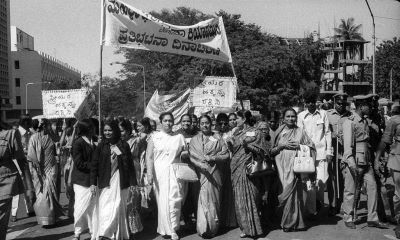Context:
India's journey towards becoming a republic is intricately woven with the fabric of diverse movements and the relentless efforts of various stakeholders who championed a progressive agenda. The echoes of justice, liberty, and equality in the Preamble of the Constitution resonate with the aspirations of freedom fighters and social reformers. However, amidst the narratives of independence, the significant contributions of feminist movements in pre-independent India often remain underappreciated, particularly in the context of women's rights and their role in shaping the republic.
Women's Right to Vote: A Pioneering Struggle:
The right to vote, a fundamental aspect of democracy, is often misconstrued as having been simultaneously granted to both men and women. This oversimplified narrative fails to acknowledge the dedicated efforts of women activists who ardently fought for their right to vote. In 1917, a pivotal moment occurred when a delegation of women activists presented a memorandum of demands for women's enfranchisement to Edwin Montagu and Lord Chelmsford, tasked with formulating self-governance for India. Concurrently, the Women's Indian Association (WIA) emerged as the first national body advocating female suffrage, addressing socio-economic challenges faced by women.
The turning point arrived with the Government of India Act in 1919, which granted provincial legislatures the authority to enfranchise women. Madras, in 1921, became the first province to embrace this change, followed by Bombay and the United Provinces. However, the journey was not without obstacles, as the Bengal Legislative Council initially defeated the enfranchisement Bill. Undeterred, suffragists, led by the Bangiya Nari Samaj, launched extensive awareness campaigns, ultimately succeeding in the passage of the Bill in 1925. Despite this monumental victory, the right to vote remained conditional on property ownership, income, and other statuses, excluding a substantial number of women from participation in the democratic process.
The Nehru Report and International Advocacy:
In 1929, the Nehru Report presented a draft Constitution at the All Parties Conference, calling for equal civil rights for all citizens. However, British reluctance to expand these rights prompted a delegation, led by Rajkumari Amrit Kaur and Shareefa Hamid Ali, to travel to London and Geneva to petition the League of Nations. The subsequent Government of India Act in 1935 marked an expansion of voting rights, paving the way for women in public offices. The 1936-37 elections saw several women contesting and joining provincial governments, fostering widespread acceptance of the idea of universal adult franchise.
Beyond the Ballot Box: Feminist Activism in Social and Personal Spheres:
The year 1927 witnessed the formation of the All India Women's Conference (AIWC), a collaboration of women-led organizations initially focused on women's education. As its scope expanded, the AIWC advocated for outlawing child marriage, raising the age of consent, and banning polygamy. Recognizing that women's emancipation necessitated reforming various religious laws, AIWC played a crucial role in pushing for comprehensive changes. In 1945-46, the AIWC adopted the Indian Woman's Charter of Rights and Duties, emphasizing equality in all spheres, economic empowerment, and the formal recognition of the value of domestic work.
The Charter went further, demanding freedom to divorce, equal property and inheritance rights, laying the groundwork for future legal reforms. Some of these demands eventually found expression in the Hindu Code Bill, enacted a decade later. The activism of these women leaders extended beyond the political arena, shaping the societal and personal spheres by challenging deeply ingrained discriminatory practices.
Post-Partition Challenges and Diverse Worldviews:
In the aftermath of Partition, reservations of seats on religious grounds emerged as a contentious issue. In the Constituent Assembly, voices like Rajkumari Amrit Kaur and Begum Qudsia Aizaz Rasul passionately advocated against any special privileges based on religion. The eventual reservation, limited to Scheduled Castes and Tribes, reflected a compromise. The AIWC, while opposing separate electorates and reservations, also grappled with internal divisions, especially regarding women's reservation in legislative bodies. This internal rift highlighted the diverse worldviews within the women's movement and the challenges faced in achieving consensus on critical issues.
Framing the Constitution and Future Feminist Struggles:
The framers of the Indian Constitution were cognizant of the diversity of thought and envisioned it as a living document, adaptable to the contingencies of the time. Over the last 70 years, feminists have continued to strive for women's rights, leading to the enactment of various laws, policies, and constitutional amendments. The groundwork laid by the pioneering women who came before us has paved the way for ongoing efforts to address gender inequalities in all spheres of life.
|
You Must Know The recent 106th constitutional amendment is a pioneering step that introduces a provision for 1/3 reservation of women in the Lok Sabha and state constituent assemblies. This initiative aims to facilitate increased participation of women in policymaking at both the state and national levels. It is anticipated that this move will contribute to the broader objective of transforming India into a developed country by the year 2047. |
Conclusion:
As India commemorates its 75th Republic Day, it is an opportune moment to reflect on and honor the invaluable contributions of feminist movements in shaping the republic. The struggles for women's rights, from the fight for the right to vote to broader societal reforms, have left an indelible mark on India's democratic journey. Lest we forget, the recognition and acknowledgment of these contributions are essential in fostering a more inclusive and equitable society. The narratives of the past should inspire and guide future generations in their pursuit of justice, liberty, and equality for all.
|
Probable Questions for UPSC Mains Exam
|
Source – Indian Express







